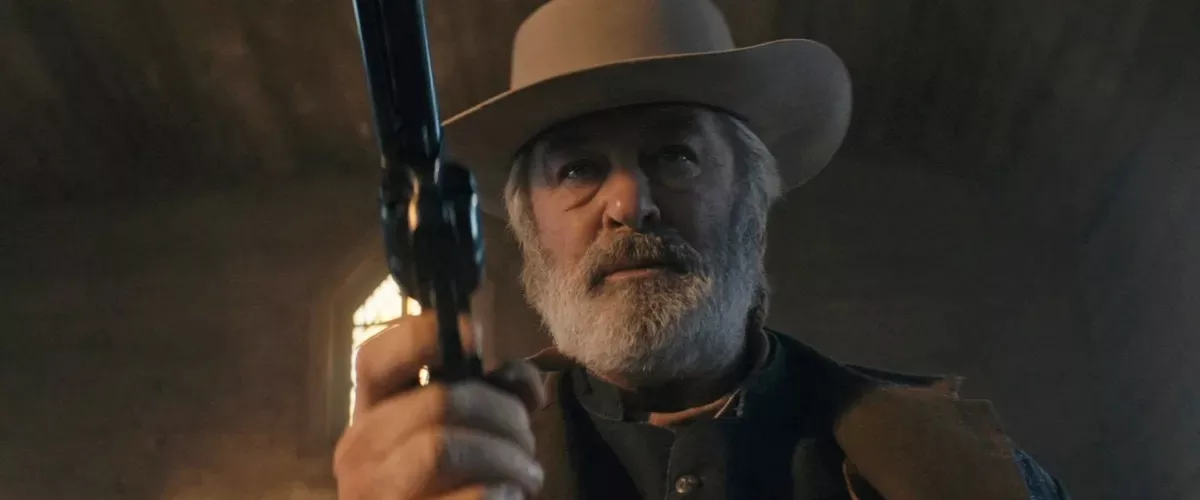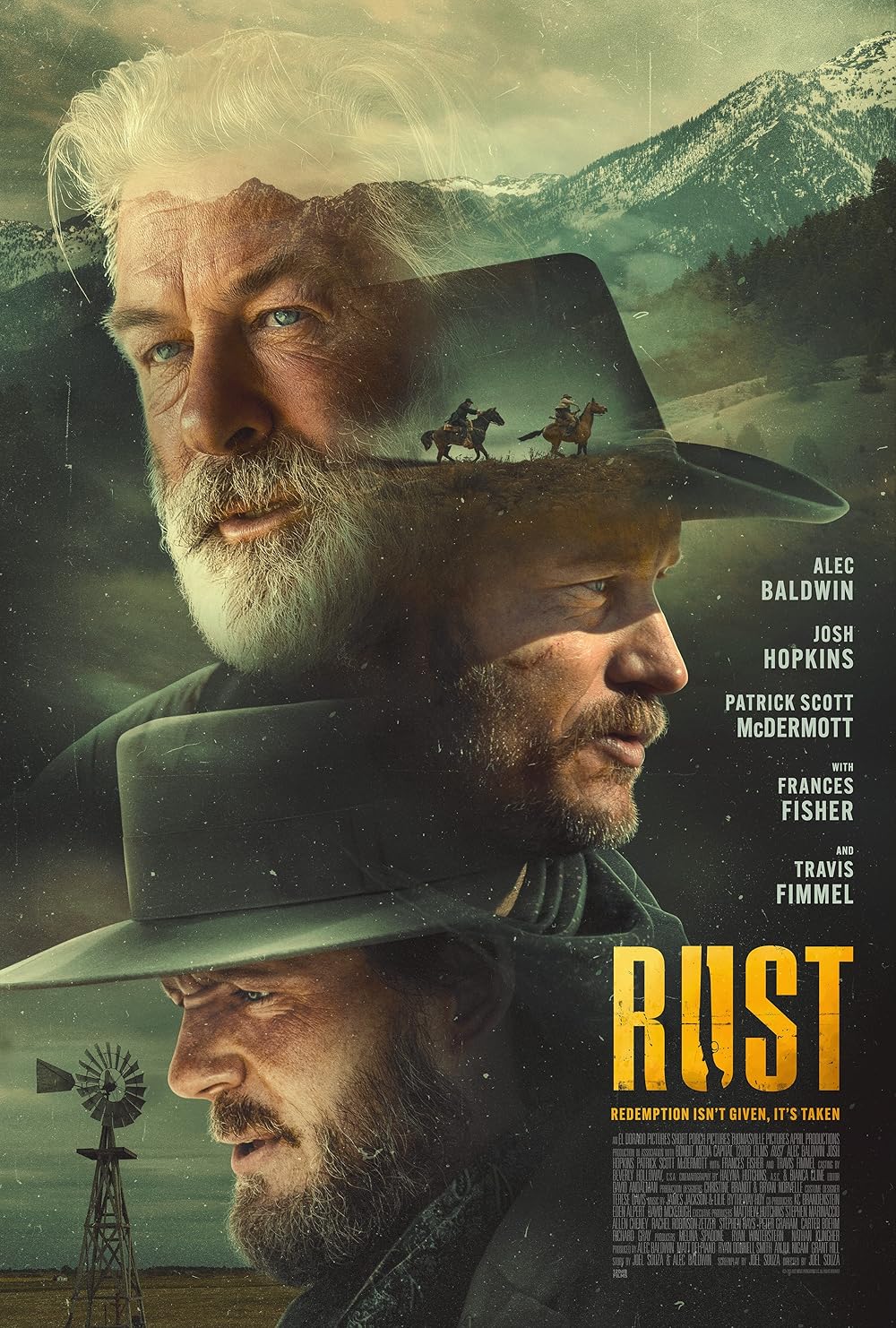Halyna Hutchins was the cinematographer of “Rust,” a Western about an outlaw who tries to save his 12-year-old grandson from being hanged for murder. Hutchins died in October 2021, when the movie’s star and coproducer Alec Baldwin discharged a prop gun that was mistakenly thought to contain no live ammo. The bullet killed Hutchins and injured the film’s writer and director, Joel Souza. Production resumed two years later with the blessing of Hutchins’ widower Matthew, who was given a producer credit.
Baldwin and other key players on with “Rust” faced civil and criminal charges but were never convicted of anything, although the first assistant director who handed Baldwin the weapon pled guilty to unsafe handling of a firearm, and the armorer received an 18-month sentence for involuntary manslaughter. The involuntary manslaughter case against Baldwin was dismissed on the grounds that prosecutors and police “intentionally and deliberately withheld” evidence that may have helped his defense.
Not too many film reviews start like this. “Rust” is no ordinary film. It has joined the list of productions that cost lives. Hutchins’ wide-format cinematography makes striking use of silhouettes, lens flares, cigarette smoke, and landscapes that reduce men and horses to specks. Her work is its own thing, but at the same time, it demonstrates a deep knowledge of iconic images and textures from Western movie history, including the smoke-and-amber interiors of “McCabe and Mrs. Miller,” the majestic landscapes of John Ford, the muddy small-town streets of Sam Peckinpah and Walter Hill, and the much-referenced final shot of “The Searchers” (quoted twice in “Rust,” once with a woman in the foreground).
The film’s cinematography is the best thing about it. “Rust” is a saddlebag full of scenes and moments borrowed from great Westerns and embellished. But even if “Rust” had ended up a stone-cold masterpiece, it still wouldn’t have been worth a single human life, because no one should die for art unless they choose to.
“Rust” opens with 12-year old Lucas Hollister (Patrick Scott McDermott) tending to his older brother and running the family farm all by himself following the death of their mother; it turns into a leisurely but brutal road movie and intergenerational bonding drama after Lucas accidentally shoots a neighboring farmer whose son tormented his kid brother, gets sentenced to death by hanging, and is rescued by his maternal grandfather, the legendary outlaw Harlan Rust (Baldwin), who wants to take him to Mexico.
This main storyline is intercut with two others. One follows the local sheriff, Wood Helm (Josh Hopkins). He was already suffering an existential crisis (he lost faith in God because of his son’s untreatable illness) when Rust broke into the jail to rescue his grandson and killed two of Wood’s deputies. “I learned a long time ago that there ain’t a God; would have been nice to have been wrong,” Wood tells his best friend, the local saloonkeeper (the always-excellent Abraham Benrubi, formerly of television’s “E.R.”, easing gracefully into the silver-haired character actor phase of his career). Hopkins is so quietly charismatic and believably of-the-era that it’s hard not to imagine how much more involving “Rust” would’ve been if he’d played the title role.
The other storyline concerns the most menacing of the bounty hunters competing to claim the $1000 reward for the capture of Rust and Lucas. If you’ve seen the classic thriller “The Night of the Hunter,” or a single still from it, you’ll know that the antagonist, self-proclaimed preacher Harry Powell, one of the most iconic evil characters of all time, has been lifted out of his movie and pasted into “Rust.” Played by Travis Fimmel (“Vikings,” “Raised By Wolves”) with more nuance than the movie deserves, he’s called Preacher, dresses in black, quotes the Bible, and makes obnoxious public theater out of his spiritual torment. He doesn’t have “LOVE” and “HATE” tattooed on his knuckles, though; maybe he was waiting to collect the reward before getting inked.
As for Baldwin the actor: it seems peculiar that “Rust” ended up being the hill his career almost died on, because even though he and Souza created the film’s story together, there’s no getting around the fact that Alec Baldwin as a tough old gunfighter was not good casting. They have a line establishing that Rust grew up in Chicago, presumably so you don’t wonder why the character doesn’t seem like a natural-born country man. But Baldwin still doesn’t have the face, the voice, or most importantly the vibe needed for this kind of movie. What’s needed is the kind of actor who, when a boy asks, “Who are you,” can reply, “This ain’t no game, boy. I say we ride, we ride, I say we eat, we eat, I say we sleep, we sleep—that’s who I am,” and not make you roll your eyes into the back of your head.
There are other missteps and failures to deliver. The clothes, shoes, and hats look new and/or freshly laundered. The movie unfolds in a series of neatly self-contained scenes and sequences that often have a theatrical feeling—and not just because the lines sound written, as in a novel, sometimes to the point of turning into an acting challenge. “Rust” can’t seem to make up its mind whether it wants to be a down-and-dirty indie film full of hard, real people or a Hollywood fantasy where every lead actor gets a long, emotional Oscar-clip monologue, and one shot from a revolver can send a man flying backward like he’s been punched by the Terminator.
There are a few scenes that feel as complete as a good short film. Many of these feature Frances Fisher, Eastwood’s ex and the madam in “Unforgiven,” playing a well-dressed stranger who introduces herself as Lucas’s aunt but seems ominous and untrustworthy. And there’s a confrontation near the end that gives the brilliant character actor Xander Berkeley a chance to inhabit an eccentric, confident, horribly funny bully worthy of an Eastwood Western.
Unfortunately, none of the three storylines and their main characters are developed thoughtfully enough to justify their full inclusion, except the one focusing on Rust and Lucas—and even that might’ve benefited from the excision of one or more scenes where they are about to get killed but escape. (The film runs two hours and eighteen minutes and feels longer.) McDermott is superb as poor, big-hearted Lucas, who had to grow up too fast. You feel the burdens he carries. You believe he’s smart and cynical enough to talk like an old prairie rat who has accepted that life is suffering. But it’s tough to assess this film’s virtues and defects without the real-life tragedy intruding. The magnitude of the loss makes such accounting feel pointless.
Baldwin has been miserly in acknowledging that a life was lost on his watch, avoiding anything resembling true sorrow, empathy or regret, instead framing Hutchins’ death as a terrible thing that happened to him personally and that’s mainly unfortunate because it ruined his sleep and made it harder to get work. Now combine that callousness with a storyline that kicks off with an accidental shooting and features nearly continuous gunfire as well as references to making sure weapons are loaded. “I wish I’d never written that movie,” the director told The Guardian. He added that he hadn’t seen Baldwin’s subsequent unscripted series with his wife Hilaria, about the Baldwin family dealing with the fallout of the shooting, because “I was busy hitting myself in the face with a frying pan.”
When the last echoes of that fatal gunshot fade and new viewers can experience “Rust” as a movie rather than a crime scene, it might be reevaluated with detachment and found less wanting. That day is a long way off.




















